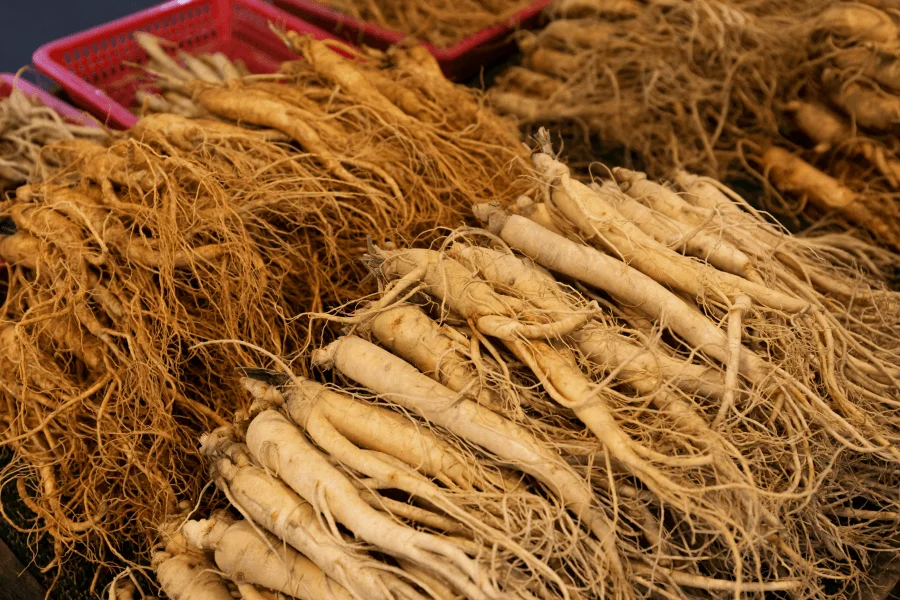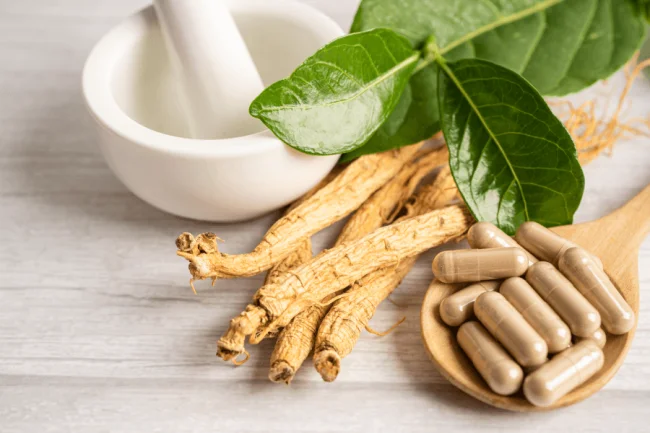Asian Ginseng, revered for its myriad health benefits, holds a special place in Asian cultures, especially in traditional medicine practices.
This blog delves into the fascinating world of ginseng, exploring its historical significance, health benefits, scientific studies, and how it is incorporated into daily life.
By the end, you’ll have a comprehensive understanding of why this herb is so valued in Asia and whether it might be worth incorporating into your own wellness routine.
Health Benefits of Asian Ginseng
Improving Cognitive Function
Studies have shown that Asian Ginseng may improve aspects of cognitive function. For instance, a study published in Psychopharmacology reported that American Ginseng improved working memory performance.
Boosting Energy Levels
Feeling sluggish? Ginseng might be the natural pick-me-up you need.
Traditionally used to combat fatigue and boost energy, ginseng is often found in energy drinks and supplements.
It works by reducing oxidative stress and enhancing cellular energy production, which helps you feel more alert and vigorous.
Enhancing Immune System
Ginseng has been found to regulate the immune response and hormonal changes due to stress, thus maintaining homeostasis.
It also helps in suppressing the occurrence of psychological diseases such as anxiety and depression.
Additionally, Ginseng modulates cortisol levels, which may alleviate symptoms associated with stress and anxiety.
Managing Stress and Anxiety
In our stressful modern lives, finding natural ways to manage anxiety is invaluable. Ginseng has adaptogenic properties, meaning it helps the body adapt to stress and maintain balance. By regulating stress hormones and promoting a sense of calm, ginseng can be a helpful ally in managing anxiety and improving overall mental health.
Promoting Heart Health
Ginseng has been recognized for its protective functions on the heart. A study in the European Journal of Preventive Cardiology discussed how Ginsenosides, active components of Ginseng, may have a protective effect on the heart.
Furthermore, research has shown that Ginseng improves cardiac function by normalizing blood glucose levels and decreasing blood pressure, oxidative stress, platelet aggregation, and lipid dysregulation.
Use in Traditional Medicine
Ginseng has been a cornerstone of traditional Asian medicine for centuries. It is often used in conjunction with other herbs to enhance its effects.
In Traditional Chinese Medicine (TCM), ginseng is classified as a “superior herb” due to its broad range of benefits and minimal side effects.
It is commonly prescribed to improve energy, boost immune function, and promote overall health and longevity.
Scientific Studies on Ginseng
Antioxidant Properties
Ginseng is rich in antioxidants, which help protect cells from damage caused by free radicals.
This property is crucial in preventing chronic diseases and maintaining overall health.
Antioxidants also play a role in slowing the aging process, making ginseng a popular ingredient in beauty and anti-aging products.
Anti-inflammatory Effects
Chronic inflammation is linked to numerous health problems, including heart disease, diabetes, and cancer.
Ginseng’s anti-inflammatory properties can help reduce inflammation and lower the risk of these diseases.
By modulating the body’s inflammatory response, Asian ginseng supports overall health and well-being.
Potential Anti-cancer Properties
Emerging research suggests that Asian ginseng may have anti-cancer properties.
Some studies shown that ginsenosides can inhibit the growth of cancer cells and even induce cancer cell death. While more research is needed to fully understand these effects, the potential is promising.
Impact on Blood Sugar Levels
For those managing diabetes or looking to maintain stable blood sugar levels, ginseng could be beneficial.
Studies have found that Asian ginseng can improve insulin sensitivity and help regulate blood sugar levels. This makes it a valuable supplement for people with diabetes or those at risk of developing the condition.
Forms of Ginseng Used
Asian Ginseng is available in various forms, each with its own set of benefits and uses. The most common types are:
- Fresh Ginseng: Used in cooking and traditional remedies.
- Dried Ginseng: Often used to make tea or added to soups and stews.
- Ginseng Extract: Concentrated form used in supplements and energy drinks.
- Ginseng Powder: Easily added to smoothies, shakes, or capsules.
- Ginseng Tablets/Capsules: Convenient and widely used form for supplementation.
How Asians Incorporate Ginseng in Their Daily Lives
In Asia, ginseng is a part of daily life in many forms. It is consumed as tea, added to soups and broths, and even used in cooking rice and other dishes.
Asian Ginseng-infused products like candies, energy drinks, and skincare items are also popular. Its versatility and wide range of applications make it a beloved ingredient in both traditional and modern contexts.
Precautions and Possible Side Effects
While ginseng is generally safe for most people, it’s important to be aware of potential side effects and interactions with other medications.
Common side effects include headaches, digestive issues, and sleep disturbances.
People taking blood thinners, antidepressants, or immunosuppressants should consult with a healthcare provider before using Asian ginseng.
Pregnant or breastfeeding women should also seek medical advice before incorporating Asian ginseng into their routine.
Combining Ginseng with Other Herbs or Supplements
Ginseng is often used in combination with other herbs to enhance its effects. Popular pairings include ginseng and ginger for digestive health, or Asian ginseng and astragalus for immune support. When combining ginseng with other supplements, it’s important to consider potential interactions and consult with a healthcare provider to ensure safety and effectiveness.
Historical and Cultural Significance
Ginseng has been used for thousands of years in Asia, particularly in China, Korea, and Japan. Known as “ren shen” in Chinese, “insam” in Korean, and “ninjin” in Japanese, this herb has been a staple in traditional medicine, valued for its purported ability to restore and enhance well-being.
Ancient texts describe ginseng as a powerful tonic that could rejuvenate the body and mind, and it was often reserved for emperors and high-ranking officials due to its rarity and perceived potency.
Conclusion
Asian Ginseng is a powerful herbal remedy with a rich history and a wide range of potential health benefits.
From improving cognitive function and boosting energy levels to enhancing immune function and promoting heart health, Asian ginseng offers something for everyone.
Whether you’re looking to incorporate it into your daily routine or use it as a targeted supplement, Asian ginseng is a versatile and valuable addition to any wellness regimen.
FAQs
What do Koreans do with ginseng?
Koreans use ginseng in various forms, including teas, soups, and stews. It’s also used in traditional remedies and as a supplement for boosting energy and overall health.
What is ginseng traditionally used for?
Asian Ginseng is traditionally used to enhance energy, improve cognitive function, boost the immune system, and promote overall health and well-being.
What are 5 benefits of ginseng?
Improves cognitive function, Boosts energy level, Enhances immune system, Manages stress and anxiety, Promotes heart health.
What does ginseng do to a woman’s body?
Asian Ginseng can help regulate hormones, reduce menstrual discomfort, and improve overall vitality. It also supports cognitive function and reduces stress, benefiting women’s health in various ways.









